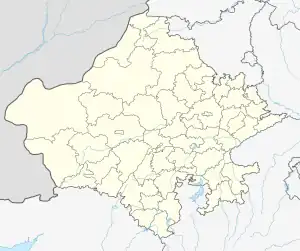Goluwala | |
|---|---|
Town | |
 Goluwala Location in Rajasthan, India | |
| Coordinates: 29°38′N 74°04′E / 29.63°N 74.06°E | |
| Country | India |
| State | Rajasthan |
| District | Hanumangarh |
| Government | |
| • Type | Gram Panchayat |
| Area | |
| • Total | 4 km2 (2 sq mi) |
| Elevation | 177 m (581 ft) |
| Population (2011) | |
| • Total | 14,960 (9,753{24JRK}+5,207{22JRK}) |
| Languages | |
| • Official | Hindi |
| Time zone | UTC+5:30 (IST) |
| PIN | 335802 |
| 01508 | 911508 |
| Vehicle registration | RJ-31 |
| Website | https://www.mhers.in |
Goluwala is a city in Hanumangarh district of Rajasthan, India. It belongs to Bikaner division. It is divided into two suburbs– Niwadan (24JRK) and Sihagan (22JRK). It is an industrial town located some 31 km west of Hanumangarh and around 51 km off to Sri Ganganagar. Total Population of Goluwala Niwadan(24JRK) & Sihagan(22JRK) is 14960 (9753+5207) in 2011 census. Goluwala can be reached from Pilibangan, the nearest railway station. It is 18 km off National Highway 62 (India) (Old numbering NH-15) and 431 km from State capital Jaipur.It is popular as name "Goluwala the Golden City".
In Ancient India The city was under region called Bhatner (alternatively spelled Bhatnair) because it was founded by king Bhupat in 255 AD.It remained in the control of Rajput of Bhati clan and later occupied by Maharaja Soorat Singh of Bikaner.[1] The remains found at Kalibangan[Pilibanga] in 1951 also gave birth to thought that this area was once a part of nearly 5000 years old Indus Valley Civilization.
Goluwala is growing as a valuable industrial town & Grain market of Hanumangarh district. In 1988's Late Mr.Sahiram (Jeldhar) and Late Pandit Kesra Ram Kayal have taken an agitation for fix up the town grain market and them efforts have changed the flora and fauna of the area. The city has been a center of learning in area since early ages.
Education
The city has been a center of learning in area since early ages. This city has a large proportion of land which is dedicated to educational institutes. There are various educational institutions in the city, including:
- Marudhara College
- BR Choudhary College
- BR Chaudhary B.ed college
- DAV Girls College
- Bhagat Singh College for higher education
- Swami Vivekanand College for higher education
Demographics
At the 2011 India census,[1] Goluwala had a population of around 28899. Majority of the population is Hindu,Jain and Sikh. males constituted around 51% of the population and females around 49%. Goluwala had an average literacy rate of around 78.32%, higher than the national average of 73.0%: male literacy is around 85.42%, and female literacy is around 70.42%.The main caste resides here are Hindu, Sikh, Jain.
Language
Bagri is the major language in Hanumangarh. Punjabi is also used as a second language of area and as the predominant language in northern areas along the border of Punjab. Hindi is the state language and English is also used among officials and youth.
Climate
The climate of Goluwala varies. The average maximum temperature in the summer is around 41.2 °C (106.2 °F) and the average minimum temperature in winter is around 6 °C (43 °F). The average annual rainfall is 200 millimetres (7.9 in).
Economy
The economy of the city is based on grain market & agriculture, its main crops are wheat, mustard and cotton. Other crops are guar, bajra, sugar cane and grams. In recent years, farmers are also diverting towards horticulture. Kinnow(a citrus family fruit or a hybrid citrus fruit from "orange") is a popular horticultural product; other fruits of the citrus family are also grown.
Industries in Goluwala city are based on agriculture and construction sector. Major industries are cotton ginning and pressing factories, mustard oil mills, wheat flour mills and brick stone, Cotton spinning and textile factories have seen high growth in recent times. Most of the factories are located in and around the City.
References
- ↑ "Census of India 2011: Data from the 2011 Census, including cities, villages and towns (Provisional)". Census Commission of India. Archived from the original on 16 June 2004. Retrieved 25 May 2011.